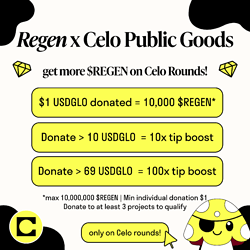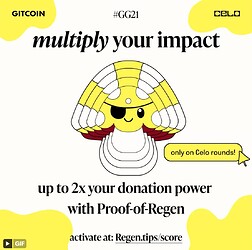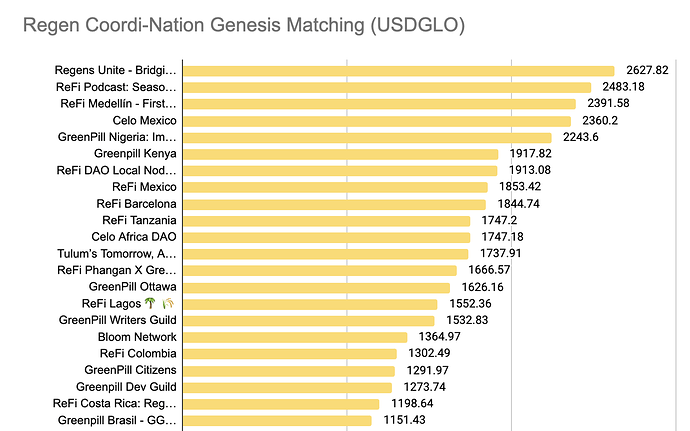This retrospective reflects on the journey of the GG21 Regen Coordi-Nation Genesis Round, highlighting our achievements, challenges, and the road ahead. It provides a detailed look at the outcomes, lessons learned, and future steps as we continue to support the global movement of regenerative communities through Web3 technology.
Round Details
Overview
The GG21 Regen Coordi-Nation Genesis Round and wider program aims to support a global movement of regenerative communities using Web3 technology to address local needs and generate real-world impact. This round was the first of its kind, bringing together the GreenPill Network, ReFi DAO, and Celo Public Goods under a unified mission. Inviting applications from ReFi DAO Local Nodes, GreenPill Local Chapters, and Celo Regional DAOs, this Genesis Round marked the official launch of The Regen Coordi-Nation program and the first step in a more extensive plan to measure, monitor, and amplify the impact of these initiatives through follow-up support and a planned retroactive funding round later in the year. Thanks to the generous support of Gitcoin, Celo Public Goods, ReFi DAO, and GreenPill Network, we have successfully raised $110,000 for this program, with $50,000 going towards this initial GG21 matching pool. Gitcoin’s support was instrumental in making this program possible, providing the foundational funding and tooling necessary to kickstart the initiative and drive the impact we aim to achieve in the subsequent stages of the program.
Round Purpose and Goals
- Catalyze Regenerative Communities and Collaboration: Unite GreenPill Network, ReFi DAO, and Celo Public Goods under a shared mission and seek to foster positive-sum synergies. By enhancing alignment and collaboration across our networks, we aim to amplify financial resources, strategic support, shared knowledge and other resources that can grow our collective impact.
- Serve as the First Phase of a Broader Program: Initiate the Regen Coordi-Nation program with the GG21 Genesis Round, followed by ongoing impact tracking and a planned retroactive funding round, ensuring that support continues to foster meaningful outcomes beyond the initial funding.
- Drive Community Engagement & Collaboration: Focus on fostering active community engagement, collaboration, and strategic marketing for the networks and individual projects in the round. This is a core strength and value proposition of Gitcoin Rounds and the Quadratic Funding mechanism.
- Innovate and Develop New Systems for Impact: Learn, experiment, and develop new systems to enhance the Regen Coordi-Nation and the broader Web3 Grants Ecosystem. This includes implementing and testing cutting-edge mechanisms like Tunable Quadratic Funding (TQF), Common Approach, Karma GAP integration, and Retroactive Public Goods Funding (RPGF) to drive more effective and transparent impact measurement and Web3 capital allocation.
Implementation
Setup and Management
The setup and management of the GG21 Regen Coordi-Nation Genesis Round involved extensive coordination between GreenPill Network, ReFi DAO, and Celo Public Goods. We utilized the Regen Coordi-Nation Portal and dedicated Telegram group as the central hub for guiding participants through the eligibility criteria, timelines, and application process. A key aspect of our approach was devolving the responsibility for nominating projects to each of the respective networks—GreenPill, ReFi DAO, and Celo Public Goods. While this added an extra layer of steps for grantees, it was crucial in ensuring that the quality of applications remained high and that the unique context and methodologies of each network were respected and prioritized. The management team, consisting of core stewards from each network, oversaw the review process, provided feedback, and ensured that all selected projects aligned with our mission.
Challenges and Solutions
- Timing and Application Process: The short turnaround time between the community round approval and the round going live created challenges, particularly with our slightly longer application process, which prevented some grantees from applying in time. Solution: In the future, allowing more time for communications and preparations before the round begins would benefit all participants and ensure smoother operations.
- Bridging Funds and Accessing Gas Tokens: There was some confusion and difficulty for participants in bridging funds and accessing the necessary gas tokens on the Celo network. Solution: We addressed this by providing additional support resources, including updated documentation and direct assistance through the Telegram group. In the future, there is much that could be done by Celo, Gitcoin and the wider Web3 ecosystem to improve and simplify these experiences.
- cUSD Donation Issues: A critical issue arose when cUSD donations were not functioning due to a bug. Solution: This was resolved before the end of the round through collaboration with Gitcoin’s technical team.
- Gitcoin Downtime and Communication: Gitcoin experienced downtime during the round, which affected grantee participation and contributions. Solution: Improved communication with grantees about potential downtime, bugs, and other technical issues is necessary to ensure that participants are well-informed and can plan accordingly.
Unique Features or Approaches
The GG21 Regen Coordi-Nation Genesis Round introduced several innovative elements designed to drive engagement, boost impact, and experiment with cutting-edge funding mechanisms.
One of the most significant experiments involved Regen Tips. In partnership with Regen Tips, we incentivized participation by offering $REGEN token allocations to contributors, with a tiered rewards system based on donation amounts. For example, every $1 USDGLO donated was rewarded with 10,000 $REGEN, and donations over 10 USDGLO or 69 USDGLO received 10x or 100x tipping boosts, respectively.
|Additionally, we trialed a ‘Proof-of-Regen Quadratic Multiplier,’ where donors could receive up to double the matching power of their contributions based on their Proof of Regen score. This mechanism, developed by the Token Engineering Commons (TEC), allowed us to experiment with TQF as a way to fine-tune quadratic funding models. However, technical challenges meant this would have delayed results release and payouts. Furthermore, from some of the preliminary results we got back it was not clear that this broad signal actually optimised or boosted the results in a desired way. As such, this led us to ultimately exclude this mechanism from the final results. Despite this, the experiment yielded valuable insights, and in collaboration with Gitcoin, TEC is exploring the development of a self-serve TQF tool that would give us more control and customisability in future rounds.
Another unique feature of the round was the Celo Public Goods (CeloPG) Signal Boosting initiative. Celo Public Goods provided seven stewards with 500 cUSD each to distribute across both rounds. Projects that demonstrated strong alignment with Celo ecosystem metrics, such as increasing Total Value Locked (TVL), transaction volume, and overall ecosystem engagement, received higher donations from these stewards. Each steward followed specific guidelines, such as a max donation of $50 per project and avoiding donations to projects with direct affiliations. This approach incentivized projects to align more closely with Celo’s mission while boosting their visibility and support within the round.
Outcomes and Statistics
Funding and Contributions
- Total Projects: 62 applications and 46 being accepted into the round.
- Total Matching Pool: $50,000 USDGLO
- Total Crowdfunded Contributions: $8,449.42 (16.71% of the matching pool)
- Total Donations: 1,472
- Total Donors: 276
- Passport Usage:
- 95 users (34.4%) received full matching (passport model score over 50)
- 38 users (13.8%) received partial matching (passport model score between 25 and 50)
For the full results and matching calculations, you can check out: Streamlit
To protect against sybil attacks and airdrop farmers, we utilized Gitcoin’s passport model-based detection system. While this system worked well to prevent sybil attacks, one drawback was that legitimate donors without a robust Web3 history will receive lower matching rates or none at all. Still, we recognize the tradeoffs and commend Gitcoin for their ongoing innovation in sybil protection strategies.
Overall, we were happy with the results of the round, both in terms of donations into the round and the results of matching fund calculations. We were also pleased with how Gitcoin’s Connection-oriented cluster-matching (COCM) worked in rebalancing results to reduce the impact of coordinated clusters and single project donors in the round.
Participant Feedback
We collected feedback from participants in the round and received the following from 11 responses.
Average Ratings (out of 5)
- Application Process: 4.38
- Fairness of Outcome: 4.29
- Communication and Support: 4.25
- Overall Program: 4.14
Feedback
Overall, participants had a positive experience with the GG21 Regen Coordi-Nation Genesis Round, rating various aspects of the process favorably. The communication and support throughout the round was well-received, with particular appreciation for the responsiveness of the support teams. The program as a whole was viewed positively, with participants noting the collaborative spirit and the effective guidance provided by the networks involved.
- “Great support and process was very smooth and quick. Also loved the opportunity to link with other coordinators.”
- “This was our first time and I think it was guided very well”
- “The operators were incredibly helpful not only in providing all instructions necessary but also in ensuring the project has the highest quality possible.”
- “Monty has been great about staying in constant communication and the Celo team has been really wonderful to work with.”
However, several participants highlighted issues such as technical bugs, including difficulties with bridging funds, accessing gas tokens, and experiencing downtime on the Gitcoin platform. There were also requests for additional features, such as better communication during technical issues and enhanced transparency in the outcome distribution process. Most of these concerns have already been addressed in the Challenges and Solutions section.
- “Would be great to be able to swap or bridge Celo or into the Celo network easier across platforms.”
- Would like there to be “Exact clarification on gitcoin passport scores and eligibility for match funding”
- “During the round there where some bugs. cUSD donations kept failing in our round during 3-4 days of the round. It took some days to fix the issue”
Impact Assessment
The impact of the GG21 Regen Coordi-Nation Genesis Round has been significant. Beyond the financial impact, the round has also significantly strengthened the collaboration between ReFi DAO, GreenPill Network, and Celo Public Goods. From my POV there feels a new sense of togetherness and a collaborative sprit, with each network gaining a deeper understanding of each other and working more closely together. This feels like just the beginning, with more opportunities for collaboration and impact ahead, particularly with the upcoming retroactive funding round and the development of a common approach to impact tracking.
Lessons Learned and Improvements
Feature Requests
While the round was largely successful, some ideas & suggestions for additional Gitcoin Grants Stack functionality that could be helpful for future rounds also surfaced:
- Revise Application Process: Providing the ability for program managers to offer feedback on submissions and allowing grantees to edit their applications with version history would improve the application process.
- Cross-Chain Donations: Implementing backend bridging that allows donations to be made from any chain, regardless of where the donor holds their tokens, would greatly enhance the flexibility and accessibility of the funding process.
- Automated Communication Tools: Developing tools for automated emails and other communications would streamline the process of updating grantees, reducing the communication burden on organizers and ensuring timely information delivery.
- Grantee Feedback Mechanism: Introducing a feature that allows grantees to submit comments with their donations could foster greater community engagement and provide a fun way to give public feedback and support for projects.
- Tunable Quadratic Funding (TQF) Tool: Creating a self-serve TQF tool built on the Allo platform would empower round operators to analyze the impact of different signals more effectively. This would reduce the bottleneck in experimentation and customization, allowing for more dynamic and responsive funding rounds.
- Automated Payout Address Verification: Ability to scan the payout wallet addresses provided to make sure they all are chain compatible. e.g. no one has provided a multi-sig on the wrong chain. We checked this manually but would be cool if Gitcoin could do it automatically.
Overall Reflection
My overall key takeaway from this round and the wider GG21 is that we are continuing to learn, evolve and progress in a positive direction but there is still much work to do. The Gitcoin stack continues to improve and the overall space is evolving rapidly. However, there is still some way to go in making Web3 and ReFi truly accessible to a broader audience, going beyond the current bubbles of adopters and enthusiasts, and attracting greater participation and capital from outside the space. I hope this round, and the Regen Coordi-Nation as a whole, can continue to support continuous learning, adaptation, and innovation to ensure that these technologies can achieve their full potential in driving ecological, economic, and social regeneration at scale.
Next Steps
As we look forward to the next phases of the Regen Coordi-Nation program, our focus will shift to building upon the foundations laid during the GG21 Genesis Round.
- Impact Measurement and Tracking: We are seeking to implement the Common Approach impact measurement system, ensuring that our local communities activities can be better monitored, understood, and communicated. This system will help us better capture the real-world impact of the projects we support, providing a clearer picture of the outcomes achieved by ReFi DAO Local Nodes, GreenPill Local Chapters, and Celo Regional DAOs. By developing a robust version of our collective impact measurement, reporting, and verification system, we aim to establish a more transparent and accountable framework that will benefit all stakeholders.
- Retroactive Public Goods Funding (RPGF): Following the completion of impact tracking, we will prepare for the retroactive funding round planned for later this year. This round will reward projects based on their demonstrated impact, encouraging continuous engagement and delivering on our commitment to support ongoing regenerative efforts. The RPGF round will also serve as an opportunity to test, refine and reflect on the systems and processes we’ve developed, ensuring they are scalable and effective for future rounds.
- Strengthening Collaboration and Learning: The collaborative spirit fostered during the GG21 Genesis Round has set the stage for even deeper partnerships. We will continue to encourage cross-network collaboration, focusing on shared learning and resource pooling to maximize our collective impact. By hosting workshops, webinars, and other community-building events, we aim to create more opportunities for knowledge exchange and joint initiatives.
- Ongoing Innovation and Experimentation: Finally, we remain committed to experimenting with new ideas and technologies that can enhance the Regen Coordi-Nation and the broader Web3 Grants Ecosystem. By continuously iterating on our approaches and staying open to new possibilities, we aim to push the boundaries of what’s possible in regenerative finance and community coordination, ultimately driving more significant and lasting impacts.
Thank you!
I want to personally express immense gratitude to Celo, Gitcoin, and the whole community of people and projects that are driving this space forward. Thank you to everyone who has been part of this journey and we’re excited about what lies ahead… Lets grow ![]()
![]()
![]()
![]()



